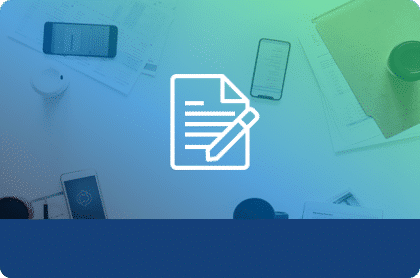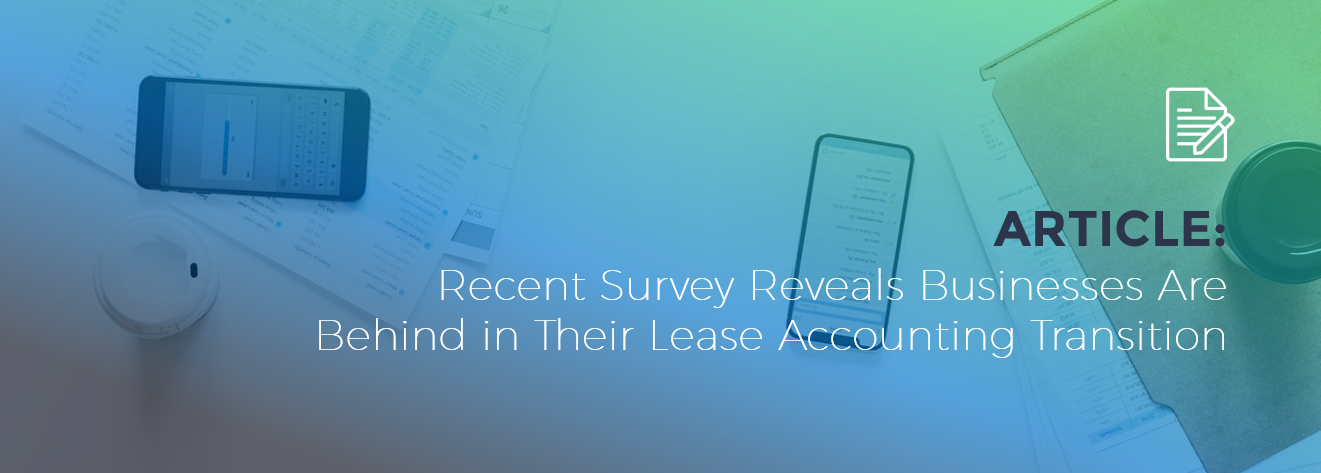Recent Survey Reveals Businesses Are Behind in Their Transition to New Lease Accounting Standards
Updated 18th May 2021 | 7 min read Published 14th June 2018

Back in February 2016, The Financial Accounting Standards Board (FASB) issued an Accounting Standards Update (ASC 842) with the intention of improving on implementation the financial reporting of lease transactions whether the leasing of aircraft, property or equipment of any type – IT, copier, medical or manufacturing.
“The new guidance responds to requests from investors and other financial statement users for a more faithful representation of an organization’s leasing activities,” stated FASB Chair Russell G. Golden. It ends what the U.S. Securities and Exchange Commission and other stakeholders have identified as one of the largest forms of off-balance sheet accounting, while requiring more disclosures related to leasing transactions.
Throughout the project by FASB and IASB, interested parties were consulted, briefed and involved particularly with regard to the role and impact of Lease Finance and the Financial implications of the changes proposed under ASC 842 and IFRS 16.
Survey Highlights
Despite the inclusive and open nature of the drafting, consultation on, and issuance of the FASB ASC 842 and IFRS 16 standards the world of Finance will, according to a recent extensive poll on the matter by Robert Half and Protiviti, need to really speed up its acceptance and implementation if the deadline of 1st January 2019 is to be met.
Interestingly, although somewhat disconcertingly, the polling results demonstrate that the vast majority of smaller companies are currently running way behind in their preparations for IFRS 16 that they have, arguably, failed even to start the implementation. That means more than 60% of firms in North America with fewer than 1,000 employees have a lot of catching up to do over the next 6 months.
Of firms polled, more than 30% of those with more than 1,000 employees had still to begin the transition.
Why when finance generally and financial reporting is so important? Many cite an internal skills shortage and the poll received input from some 2,000 firms in 20 of the major cities of the US. Of those polled just 48%, fewer than half had even completed an assessment of just what resource and time are required in order to be compliant for the appropriate deadline.
"Companies cannot underestimate the amount of work required for the new lease accounting standard," said Tim Hird, executive director of Robert Half Management Resources. "Firms that haven't started risk being in catch-up mode the moment they do and scrambling to find experienced professionals who can quickly step in to help organizations meet the new guidance."
Have our finance people learnt from the recent revenue recognition work? Well, according to the survey, whilst being of the opinion that this transition will be the more challenging of the two they do believe that they will learn and gain from the work and apply that knowledge and experience to the lease accounting adoption. “When”? – well if that doesn’t start soon then they will not finish.
Hird added, "Staffing lease accounting initiatives often proves difficult for organizations. Because the guidance is still relatively new, many companies lack the necessary expertise. In response, businesses are working with outside consultants and interim professionals, either to access the requisite skills or to help cover day-to-day accounting needs left open by full-time employees taking on lease work."
Next Steps
Is there the resource available to take on this transition?
Is there time to attain compliance under ASC 842 and/or IFRS 16?
With the deadline for implementation fast approaching the need for complete and centralised data is ever present. If the 1st January 2019 deadline is to be met, companies should already be well on their way to understanding what leases are impacted and should have, at a minimum, started collating the relevant lease information on a centralised data repository.
So how many leases does your company have?
Where are the assets and where are the contracts?
Whilst it is still possible for companies to make adequate adjustments and implement the relevant processes, systems and controls required to ensure full compliance, companies should ideally be further along in their preparations if they are to give themselves enough time to make astute transition decisions that are in the best interests of their business.
The longer companies delay their implementation preparation, the fewer choices they will have surrounding certain accounting policy elections and judgements.
For example, if a company delays its implementation preparations for too long, they will have little choice but to apply the Modified Retrospective (Cumulative catch-up) transition method. This is because, to apply the Fully Retrospective approach, entities are required to report comparative figures for dual lease accounting standards simultaneously from 2018 onwards to demonstrate the difference between IAS 17 and IFRS 16 – though under ASC 842 a different method can now be applied using ASC 840. To achieve this under IFRS 16, companies will have to collate all the essential historic lease data and lease records early in the transition process i.e. by the end of 2017 – by the way it is now 2018!
What is the Modified Retrospective method?
How does your company achieve the Fully Retrospective Approach?
Transitioning to the new lease accounting standard, sadly, isn’t just as simple as bringing all off-balance sheet lease commitments (currently likely to be operating lease footnote disclosures) onto the balance sheet. In order to accurately record the appropriate assets and liabilities needed for full accounting compliance, entities will be required to reconsider existing processes, controls and IT systems in order to support a successful transition.
In an effort to support a successful transition to the new accounting standard, whether FASB or IASB and to simplify compliance with IFRS 16 or ASC 842 many organisations will need to evaluate and review the suitability of any existing lease accounting systems and processes. To accelerate the transition, they may also consider implementing new systems that allow them to automate elements of the lease accounting process that currently may be managed manually on antiquated applications such as spreadsheets.
Is there further evidence of unpreparedness?
Is the world waking up?
In a separate survey conducted in May 2017 by Innervision, Finance Officers when asked how far they are in identifying a lease accounting solution, 45% of respondents reported that they are currently researching potential vendors in the effort to implement a new system but perhaps alarmingly 33% have not yet started their search for an appropriate vendor/solution. Only 10% of respondents reported that they had already chosen a lease management and accounting system, while 8% responded that they are in the RFP stage of vendor/system selection. Just 4% of respondents intend on developing their own internal system.
Whilst these findings are consistent with earlier conclusions indicating that companies are currently still stuck in the early assessment and data collation phase of the implementation process Innervision can report that interest in lease compliance in general and external software solutions, in particular, has been a real feature of the past year. Companies are waking up and increasingly looking to technology and consultant-based solutions to bridge the skills gap, have a ready-made plan and make up for lost time.
How Lease Accounting Software Will Help
When transitioning to IFRS 16 and FASB ACS 842 the top 4 auditors are recommending that companies consider the adoption and deployment of appropriate lease accounting systems that will help simplify the implementation of either standards.
"Following the release of both new lease accounting standards, it’s clear that creating a centralised, electronic repository of all equipment and real estate leases held should be a priority for companies with leased assets."
Sean Torr, Advisory Managing Director and Lease Accounting Services Leader:
Deloitte
LOIS - Lease Accounting, By Innervision, is a hassle-free accounting solution that delivers all the transition tools and functionality needed to extract, validate and report on all the critical lease data required for full compliance with both IFRS 16 and FASB ASC 842.
Companies that use LOIS to manage and enhance their lease portfolio are able to produce all the accounting information required to accurately complete the financial statements obligatory for compliance; including income statement, cash flow and balance sheet. LOIS will also generate the complex accounting calculations for you.
For the Answer to the questions above and to all your concerns see - 7 Steps to Lease Accounting Compliance
For further guidance on implementing the new lease accounting standards, we have put together this inclusive guide to transitioning to the new standards – IFRS 16 or FASB ASC 842. Just follow the link below to access the guide.







